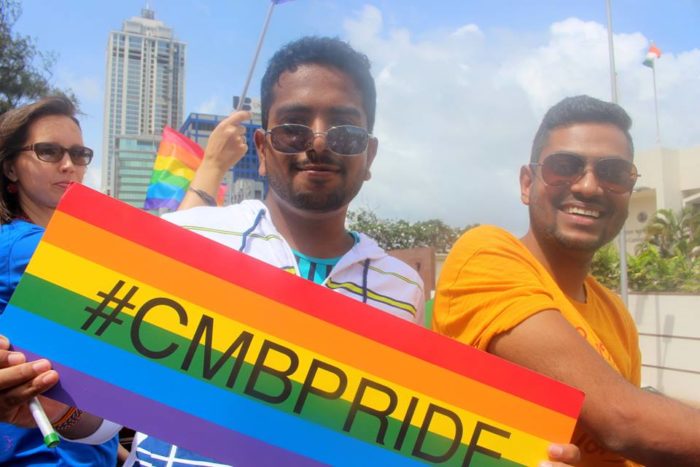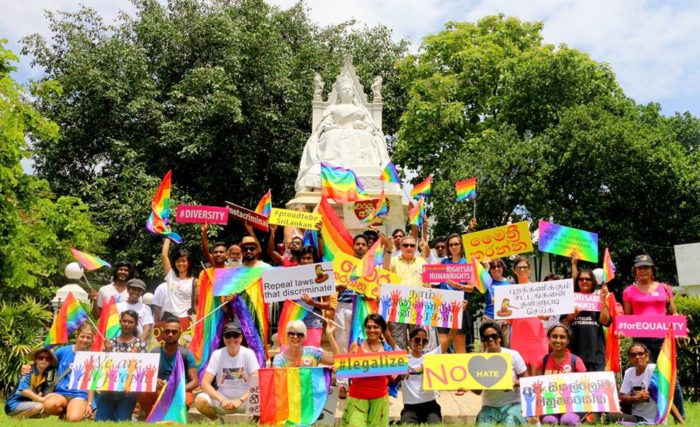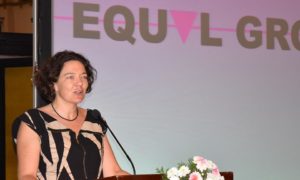23rd June 2016 Colombo, Sri Lanka
Taking pride in PRIDE

Colombo is reaching the end of a three week celebration of PRIDE activities. The events, largely coordinated by Equal Ground, included a Rainbow Bus Parade, a pop quiz, a Film Festival at the British Council and a kite festival – an appropriately diverse range of ways to draw attention to an important human right, the right not to be discriminated against because of sexual orientation or gender identity.

The High Commission supported the full programme, with a special focus on a decriminalisation workshop and a forum on the corporate benefits of diversity.
 I spoke at this last event, taking my inspiration from a recent speech made by Robert Hannigan, the Director of the UK’s Government Communications Headquarters, popularly referred to as GCHQ, the UK’s centre for signals intelligence. The speech focused on the great changes that have taken place within GCHQ, just as within the wider UK civil service, in terms of acknowledging acceptance of difference as a global good. His focus was sexual orientation, although this applies to all forms of diversity.
I spoke at this last event, taking my inspiration from a recent speech made by Robert Hannigan, the Director of the UK’s Government Communications Headquarters, popularly referred to as GCHQ, the UK’s centre for signals intelligence. The speech focused on the great changes that have taken place within GCHQ, just as within the wider UK civil service, in terms of acknowledging acceptance of difference as a global good. His focus was sexual orientation, although this applies to all forms of diversity.
GCHQ’s most famous member of staff was Alan Turing. He became famous for two reasons – one, his mathematical genius which led to the breaking of the German Enigma code and shortening the Second World War and all the lives that that saved, but also the creation of the world’s first digital computer and everything that now flows from that, including the Internet. He’s also famous for being gay, and sadly famous for his treatment; his conviction, prosecution and chemical castration at the hands of the criminal justice system, and his subsequent suicide in 1954.
It was partly to honour Turing that GCHQ lit up their building to celebrate IDAHOBiT day last year. It was also kind of an act of atonement – for the lost opportunity of his early death. Who knows what Turing would have gone on to do, where, for example, he might have taken his pioneering interest in Artificial Intelligence? As Robert Hannigan said, we will never know and should never, as a society, repeat that mistake.
It took a while for the UK to learn that lesson. But although there is always further to go, we now have strict legislation in place to protect and encourage diversity of all kinds, in the public and the private sector.
 The LGB&T community in Sri Lanka is not so fortunate. Equal Ground report that their NexGen project has seen 67 cases of hate crime reported within the Colombo area since December 2015. That is almost ten cases a month. Given the low level of reporting of such incidents and the limited geographical scope of the project, the real problem is likely to be on a much larger scale.
The LGB&T community in Sri Lanka is not so fortunate. Equal Ground report that their NexGen project has seen 67 cases of hate crime reported within the Colombo area since December 2015. That is almost ten cases a month. Given the low level of reporting of such incidents and the limited geographical scope of the project, the real problem is likely to be on a much larger scale.
Here is a typical, anonymised, case reported to Equal Ground through NexGen. A young man was open about his gay sexuality on his Facebook account. Six “friends” responded to this by attempting to sexually abuse him at his university hostel. Trying to run away, the young man tripped down the stairs, damaging his spine. After a stay in hospital, he returned to the university, to find himself ostracised and attacked again because of his sexual orientation. The university has failed to take any action against the perpetrators, so the individual has taken the matter to court, but is still receiving threats from his fellow students.
The second focus of High Commission support to PRIDE this month was a workshop on decriminalisation. Homosexuality is still illegal in Sri Lanka, and PRIDE’s programme included several events encouraging activism to campaign against criminalisation. Together with other international missions, the UK has spoken out against this discriminatory legislation, calling on the government to repeal sections 365 and 365A of the Penal Code.
I look forward to the day when being discriminated against or abused for being gay appears as outdated as being denied the vote or not allowed to own property for being female.
There is much truth in this post. I hope someone read it. But I think as usual nobody will pay attention …
Great post, Laura! Love has no color or gender. One of humanity’s big mistakes is putting love in a frame. Everyone should be able to love and be loved the way his\her soul demands it.
you are right..
thanks for shearing.
Love shouldn’t be illegal, especially when nobody is hurt… It’s almost to make loving brunette women illegal…
I couldn’t agree more. I’m glad you enjoyed the blog, Laura